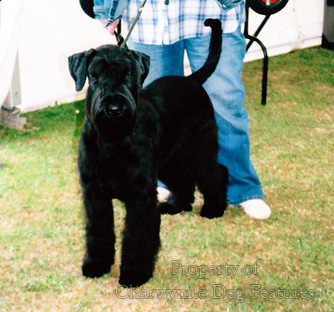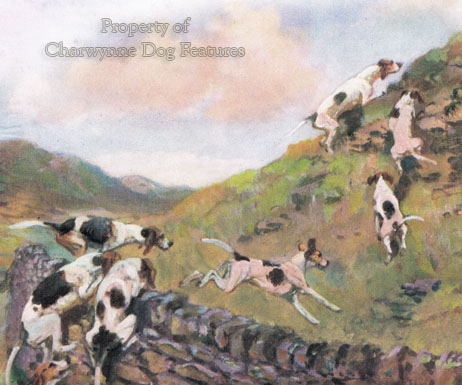569 Inconvenient Truth
AN INCONVENIENT TRUTH
by David Hancock
 The laws of unintended consequences can apply in the world of dogs as much as in other fields. Recent legislation concerning dogs deemed dangerous, hunting with dogs, electric collars, tail docking and welfare generally has not altogether served dog's best interests, however well intended. Reformers making moral judgements can so often be emotional rather than rational. We live in an age when rather than tolerate those matters we disapprove of, we seek to ban them. It always pays too to proceed warily over banning activities which have been practised for centuries without a ban being desired. There is little evidence in the world today to show that man has suddenly become wiser. Whilst every decent person rightly wishes to reduce animal suffering, the way in which that wish is implemented is crucial; there is a huge difference between raw intellectual energy and mature well thought-through wisdom.
The laws of unintended consequences can apply in the world of dogs as much as in other fields. Recent legislation concerning dogs deemed dangerous, hunting with dogs, electric collars, tail docking and welfare generally has not altogether served dog's best interests, however well intended. Reformers making moral judgements can so often be emotional rather than rational. We live in an age when rather than tolerate those matters we disapprove of, we seek to ban them. It always pays too to proceed warily over banning activities which have been practised for centuries without a ban being desired. There is little evidence in the world today to show that man has suddenly become wiser. Whilst every decent person rightly wishes to reduce animal suffering, the way in which that wish is implemented is crucial; there is a huge difference between raw intellectual energy and mature well thought-through wisdom.
The discredited Dangerous Dogs Act of 1991 is a classic case of zealous politicians responding inappropriately to tabloid hysteria, following horrific cases which deserved a reaction. But, as with far too many court cases in recent years, expert input was far from expert. Both in the drafting of the Act and in subsequent court cases, the sheer foolishness of those bodies and individuals deemed expert was laid bare. They were unpunished, a thousand innocent dogs lost their lives. Other countries mindlessly copied our legislative stupidity and another thousand innocent dogs lost their lives. It is worth remembering that the two bodies which directly advised the Home Office in the drawing up of this senseless Act, the Kennel Club and the RSPCA, were both, on paper that is, committed to obtaining a better life for dogs. 
It took a decade for these bodies even to acknowledge that firstly the wording of the Act was based on their ignorance, and secondly the implementation of the Act was quite absurd. We expect a government department to be woefully inefficient, the Home Office especially, but for The Kennel Club and the RSPCA to harm so many innocent dogs by their stupidity and elevated, but entirely misplaced, ideas of their own competence is simply shameful. It would have been understandable for 'authority' to rethink their legislation-framing ability, but no, all too soon, they were at it again. The length of a dog's tail suddenly became the most vital canine issue of the day, ahead of inheritable blindness, deafness and crippling spinal and neurological diseases. Which handicaps a dog more, the loss of its tail or a disabling disorder? Docking is not a new issue in dogs, or in sheep, but whatever the effect on a pup, it became a major discussion point, a top priority, almost an obsession for some. I don't have strong views on docking but I have very strong views on matters which are not life-threatening being allowed to become the number one issue. For this whole matter to have been instigated by veterinary scientists in a world where they of all people know of the daily suffering of disabled dogs should be a source of shame for them.
Whatever the rights and wrongs of docking-bans, it is unthinking to believe that this topic only affects dogs' tails. Many of the terrier breeds have been purpose-bred for over a century to possess a certain tail carriage. A high-set tail, a level topline, no fall-away in the croup and less angulation in the hindquarters has given these breeds the conformation now considered typical. A full-length tail cannot be imposed without concomitant thought about rear-end construction. If a hound-tail is desired, like the stern of a Foxhound, then it's not a case of 'stick the tail on the donkey', as in the party-game. The rear-end has to be reconstructed and the public perception of some terrier breeds realigned. This may well lead to full-tailed pups in some breeds being unwanted and dogs with uncharacteristic tails being unfavoured in the rehoming world. These are not matters to be shrugged off; they become welfare issues, they affect dog's welfare.
There is a comparable situation over the zeal for a ban on electric collars. I don't like them. But I've heard of many cases where the sensible controlled humane use of this device has saved a dog from destruction. For an electric collar to become an acceptable routine training device is wrong; it tells you much about the competence of the user. But there might well be some cases where the restrained very temporary use of such a device, and a device perhaps controlled by licence, ensures that a dog is kept, not destroyed. Control is always better than outright bans; it can be abused of course, but then so can bans. Which is preferable a dead dog or one slightly shocked into acceptable behaviour? Which is more wicked, knowingly breeding from flawed stock or docking a tail? The traditionally docked breeds, like the Rottweiler, the Dobermann and the Boxer may well suffer before their 'new' tail is fastened on satisfactorily.
On all these topics: the tail-length issue, the identification of potential danger in dogs by their appearance, the proof of cruelty to foxes, without a working definition of cruelty, and the wholescale condemnation of electric collars, bodies with responsibilities have accepted 'expert' evidence or testimony which is far from expert. Expert witnesses even when called by the prosecution are there to assist the court not the conviction. There is a court rule requiring a declaration by an expert witness that this rule is understood; it is generally ignored. This can lead to a rogue vet giving evidence which leads to a dog's death not admitting that the veterinary authorities have firmly stated that a vet is simply not trained to identify breeds. It can result in a policeman, with no formal qualifications in animal studies being accepted as an expert in identifying and therefore condemning to death, dogs of a certain build. Our judicial system was not founded to produce such an outcome. 
The Hunting with Dogs Act was passed through Parliament more as an act of class warfare than an animal welfare bill. The result has been that men in red coats continue to ride out but lowlier souls with their humble lurchers are punished. As more and more cases of maimed foxes are reported, the means of controlling their numbers is now crueller. If you read Jill Mason's charming book The Eskdale and Ennerdale Foxhounds (Merlin Unwin Books, 2005), superbly illustrated by her husband David, you can soon detect the country-loving, fox-respecting, humanely-intentioned humility of this foot pack over more than a century. These hunters do not ride to hounds or take a break from a city desk, they walk their own hillsides. Cumbrian hill foxes can devastate the lambing fields and if a group of farmers need to protect their lambs, who are we to tell them how best to do this. It is notoriously difficult to shoot a fox cleanly; it is appallingly cruel to maim one and not despatch it. Cumbrian farmers are not cruel people; they battle against nature every working day, they understand their country but now they are being forced to adopt a far crueller system of fox-control: fox-maiming.
How many hounds will lose their lives as a direct result of this vengeful bill? Already the world-famous Dumfriesshire Foxhound pack has been dispersed and their invaluable genes lost to us. If this Act had been decided on honest evidence (read Pye-Smith's devastating exposure 'Rural Rites', Middle Way Group, 2006, to discover the skulduggery involved) and an unambiguous definition of cruelty, it would have had my support. I admire foxes, accept that they must be controlled but am most unhappy about the way this misbegotten bill has punished them. I followed the debate in Parliament on this bill and was astounded at the sheer ignorance and false arguments put forward by MPs elected to represent us on such a matter. The lack of understanding about the management of the countryside in Westminster has long been woeful. This was a new low. That is bad enough, increased suffering by foxes as a direct result of London politicking is worse, the loss of good hunting dogs, to no good effect, is not good either. 
In all these misguided ventures, certain outstanding individuals impress: the London Labour MP Kate Hoey, vilified for standing up for truth and honesty in the anti-hunting debate; Juliette Glass and Ann Harpwood in the DDA battles and those individuals with their underfunded organisations striving, whether over tail-docking or electric collars, just to present another point of view. False sentiment, over-emotional campaigning, narrowly-focused single-issue lobbying can bring unfortunate results. If tail-docking is truly unacceptable and a ban necessary, so be it. But is it our top priority in the world of canine care? Of course, more than one animal welfare campaign can be run concurrently, but concentrating on the most important one has greater impact. In the abolition of bull-baiting, campaigners put the welfare of the bull ahead of that of the baiting dogs, more of whom died than bulls. They achieved their top priority.
It is an inconvenient truth that the welfare of dog is forever at the mercy of lobbyists. On matters like ear-cropping, dog-cart excesses, organised dog-fighting, bear-baiting and expeditation, lawing or hambling, cruelty is easily spotted. But in every case, however hard the lobbying, the long-term outcome needs to be thought through. I am all in favour of planned breeding programmes, based on genetic advice, to reduce the incidence of inherited or breed-predisposed defects. But care has to be taken to balance any restricted breeding schedules with the effect of that on the breed's gene pool. An outstanding dog with a disappointing hip score deserves to be considered when breeding plans are being discussed. Restricting a gene pool can harm a breed much more than surgically shortening the tail. One source of harm arouses emotion, the other is unseen but infinitely more painful for dogs.
I have town-dwelling friends who are much more kindly disposed towards country sports once they are in possession of the full picture on them. I have a colleague who is and always will be opposed to them. But he was furious when fox-hunting became a synonym for all hunting with dogs, when fox-hunting became the sole target and game-shooting ignored. He takes the view that 'using half-tame pheasants as warm-blooded targets for over-indulged over-paid city businessmen' (his words) was a far far higher priority for attention by campaigners. He quotes the distressing bags on the big sporting estates in the past, e.g. when in a day of slaughter not sport, seven guns brought down 3,937 pheasants in one day (18 Dec 1913) on the Buckingham estate of Lord Burnham. He accepts the need for fox-control however, but only if conducted in the most humane manner.
I agree that point with him; I also take his point about tackling the greater cruelty first. Before we legislate on dogs' tails, can we first do something about the breeding of blind, deaf and needlessly crippled dogs. Before we ban electric collars, can we check if a total ban is truly the best way forward. When endorsing legislation banning hunting with dogs, can those some distance from the subject have the humility and intellectual rigour to become well-informed on the subject first. The Dangerous Dogs Act of 1991 is a sad example of fools rushing in; to list any breed as dangerous is rampant racist rubbish. Remedying the work of ill-informed bodies like the RSPCA and the KC, who advised the Home Office on this, is now being attempted, yes, by the RSPCA and the KC! It is an inconvenient truth that they caused the problem.
Moral judgements hastily made into unjust unworkable laws so easily impose cruelty from unintended consequences. The recent heart-tugging example of a well-behaved, utterly blameless, wholly innocent, cross-bred dog called Tyson, cruelly imprisoned under the DDA, for four miserably-long years, entirely because of his appearance, should shame us all. Dogs can have a Guantamano Bay existence too - and it's our fault. Our elected representatives passed the law which kept him there - and they're still at it! Legislators remind me of a donkey carrying a load of encyclopaedias, they are laden with information but are none the wiser. Maimed foxes, dogs detained without trial, tail-length rated more important than life-length and a powerful desire to ban recklessly, out of moral rectitude not impressive wisdom, do not constitute animal welfare, just exemplify human folly. There has to be a better way. That better way needs to be free of politics and clear of over-zealous moral crusaders. When we get it wrong, dogs die.